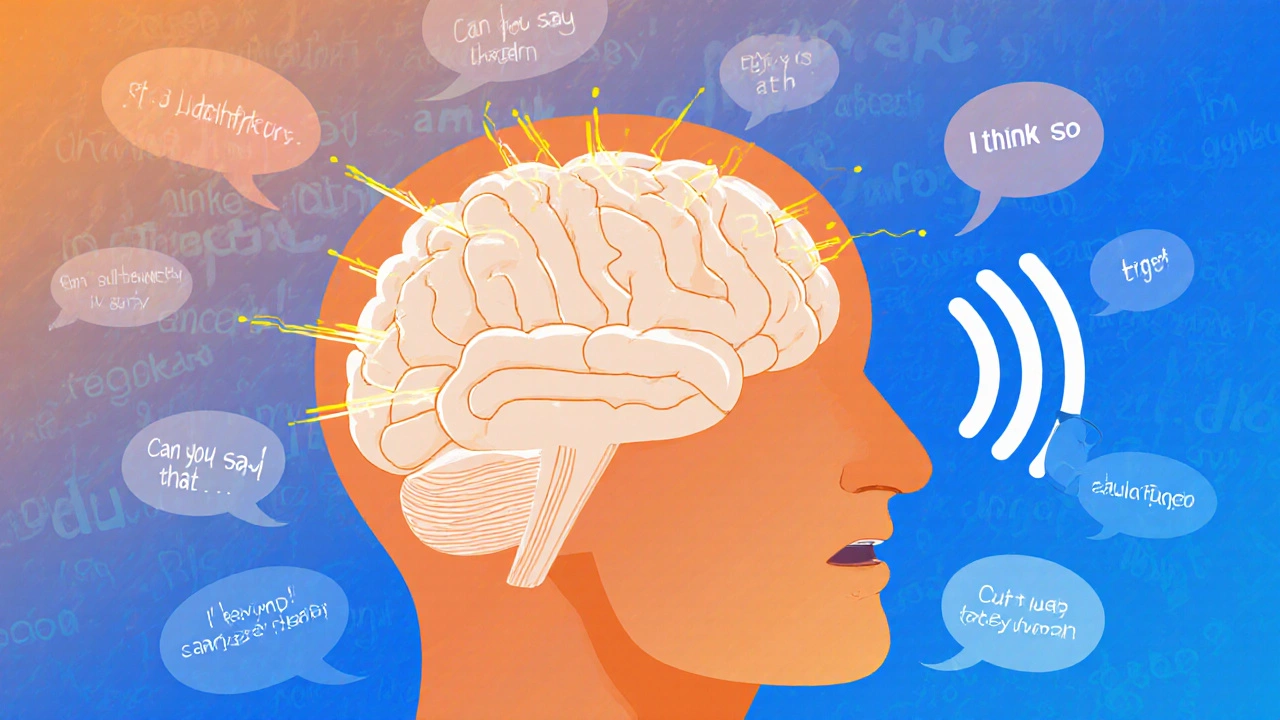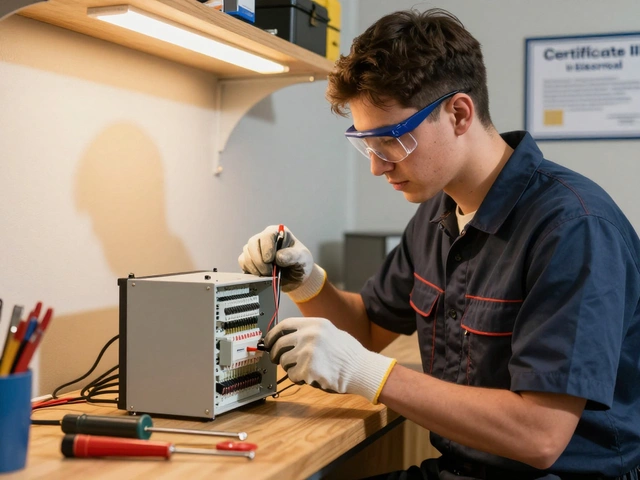Oct
27

- by Dhruv Ainsley
- 0 Comments
English Speaking Confidence Tracker
3-Second Rule Challenge
Practice responding within 3 seconds. Record yourself to track improvement.
Daily Progress Log
Progress: 0 days in a row
Consistency is key - even 5 minutes daily counts!
Want to speak English better but feel stuck repeating the same phrases? You’re not alone. Millions of people around the world learn English in school, memorize grammar rules, and still freeze when someone asks them a simple question. The problem isn’t your brain-it’s how you’ve been taught to learn. Speaking isn’t about knowing the right words. It’s about training your mouth, your ears, and your confidence to move on autopilot. Here’s how to actually get better-without spending years in a classroom.
Stop memorizing. Start mimicking.
Most people think learning to speak English means learning new vocabulary lists. That’s backwards. You don’t learn to ride a bike by studying the physics of balance. You get on the bike and try. Same with speaking. The fastest way to improve is to copy native speakers-not just their words, but their rhythm, pauses, and tone.
Find a short video of someone talking about something you care about: a cooking tutorial, a tech review, or even a funny TikTok. Play it for 30 seconds. Pause. Say it out loud, exactly how they said it. Try to match their speed. Notice how they drop the ‘t’ in ‘want to’ and say ‘wanna’. How they stress the first syllable in ‘important’. Don’t worry if it sounds weird at first. Your mouth is learning new muscle patterns. After 10 tries, you’ll start sounding more natural.
This isn’t just a trick. A 2023 study from the University of Melbourne found that learners who spent 15 minutes a day mimicking native speakers improved their fluency scores by 40% in just six weeks-twice as fast as those who studied grammar.
Speak even when you’re scared
Waiting until you’re ‘ready’ to speak is the biggest mistake. There’s no such thing as ready. You become fluent by speaking when you’re unsure. Every time you open your mouth, you’re rewiring your brain.
Start small. Talk to yourself in the mirror. Describe what you’re doing: ‘I’m making coffee. The water’s boiling. It smells like chocolate today.’ Say it out loud. Then try it while walking to the bus stop. Narrate your day. No one’s listening. No one cares if you mess up. And that’s the point.
Next, find one person you can speak to without fear. A friend who doesn’t correct you. A language partner on a free app like Tandem. A cashier who says ‘Have a nice day’ every time. Don’t aim for perfect. Aim for consistent. Five minutes a day, every day, beats two hours once a week.
Listen like you’re listening to music
You don’t need to understand every word to learn from it. Think of English like a song. You don’t need to know the lyrics to feel the beat. Put on a podcast or YouTube channel you enjoy-comedy, true crime, travel vlogs-and just listen while you do dishes or commute. Don’t take notes. Don’t pause. Just let the sounds wash over you.
After a week, go back and listen again. This time, catch one phrase you recognize. ‘I couldn’t believe it.’ ‘It’s not that big of a deal.’ Write it down. Say it three times. Now you’ve got a real, usable chunk of language-not a textbook sentence.
People who listen actively this way pick up natural expressions faster than those who study grammar books. Why? Because you’re learning how English is actually spoken, not how it’s written.

Use the 3-second rule
When someone asks you a question, you have three seconds to answer. If you wait longer, your brain starts overthinking. ‘Should I use past tense? Is that the right word? Did I say it right?’ That’s when you freeze.
Train yourself to respond within three seconds-even if it’s just ‘I think so’ or ‘Maybe.’ It doesn’t have to be perfect. It just has to happen. Practice this with simple questions: ‘What did you eat for lunch?’ ‘Do you like this movie?’ ‘How was your weekend?’
Record yourself answering. Then listen. You’ll hear the gaps, the ‘umms’, the hesitation. That’s data. Next time, you’ll fill those gaps with something real. Not a perfect sentence. A real one.
Build a speaking toolkit
You don’t need to know 10,000 words to have a conversation. You need 50 useful phrases that work in 90% of situations. Here are five to start with:
- ‘I’m not sure, but I think…’ - Lets you answer without sounding unsure.
- ‘Can you say that again?’ - Better than nodding and pretending you understood.
- ‘What I mean is…’ - Lets you fix your own mistake smoothly.
- ‘That’s interesting. How about you?’ - Keeps the conversation going.
- ‘I’m still learning, so bear with me.’ - Gives you permission to be imperfect.
Use one of these every time you speak. Even if it’s just to a pet or a plant. They’re your safety net. Over time, you’ll start replacing them with your own phrases.

Track progress, not perfection
Don’t measure yourself by how many words you know. Measure yourself by how often you speak without panic.
Keep a simple log: every day, write down one thing you said in English that you wouldn’t have said a month ago. Maybe it was asking for extra sauce at a café. Maybe it was telling a coworker your idea in a meeting. That’s progress.
After 30 days, look back. You’ll see a pattern. You’re not just learning English. You’re becoming someone who speaks it. That’s the real goal.
What’s holding you back?
Most people think they need a course to speak better. But the best course is your daily life. You don’t need to pay for an app or fly to London. You need to use English every day-even if it’s just talking to yourself.
If you’re still stuck, ask yourself: Are you practicing speaking, or just studying it? If you’re spending more time watching videos than saying them out loud, you’re not practicing. You’re watching.
Speaking isn’t a skill you learn. It’s a habit you build. And habits grow with small, repeated actions-not big, perfect moments.
How long does it take to speak English fluently?
There’s no fixed timeline, but most people notice real improvement in 6 to 12 weeks if they practice speaking for 15-20 minutes every day. Fluency isn’t about knowing every word-it’s about being able to express your thoughts without stopping to think. That happens through repetition, not memorization.
Should I join an English speaking course?
Only if the course focuses on speaking, not grammar tests. Many courses waste time on multiple-choice quizzes and writing essays. Look for ones that give you real conversations with feedback. Free options like ConversationExchange or Meetup groups often work better than expensive apps. The goal is to talk, not to pass a test.
I’m embarrassed to speak. What do I do?
Everyone feels that way-even native speakers mess up. The trick is to reframe mistakes. Instead of thinking ‘I sounded stupid,’ think ‘I just practiced.’ Every time you speak, you’re building courage. Start with low-stakes situations: ordering food, asking for directions, chatting with a barista. No one is judging you as harshly as you’re judging yourself.
Can I improve without a native speaker?
Yes. You can improve by listening to podcasts, mimicking videos, and speaking to yourself. But eventually, you’ll need real interaction to get feedback. Try free language exchange apps. Find someone learning your language. You teach them for 15 minutes, they teach you for 15 minutes. No pressure. No cost. Just practice.
Why do I understand English but can’t speak it?
Because listening and speaking use different parts of your brain. You’ve trained your ears to understand. But your mouth hasn’t learned how to produce the sounds quickly. That’s why you need to speak-even when you’re not sure. It’s like learning to dance. You can watch all the videos, but you won’t move until you get on the floor.





